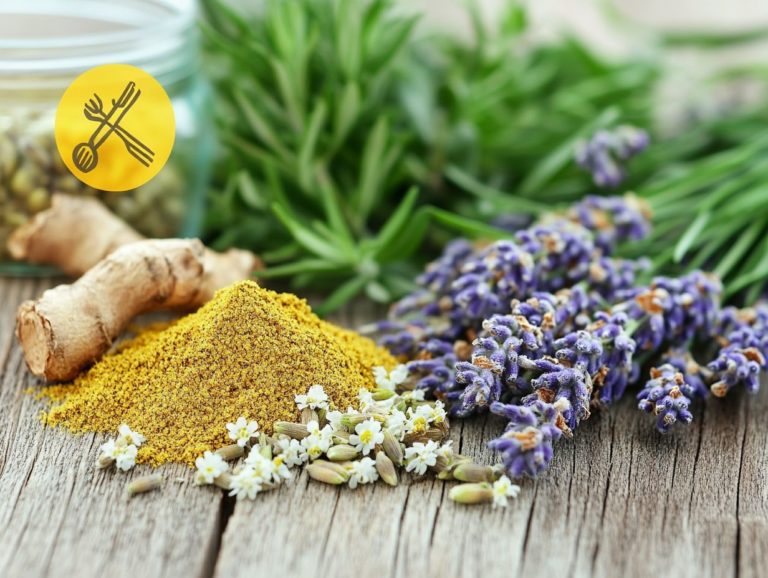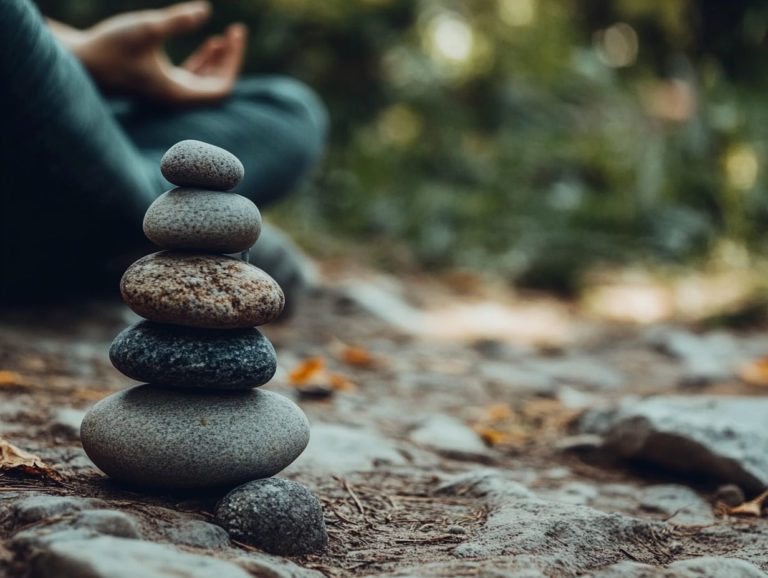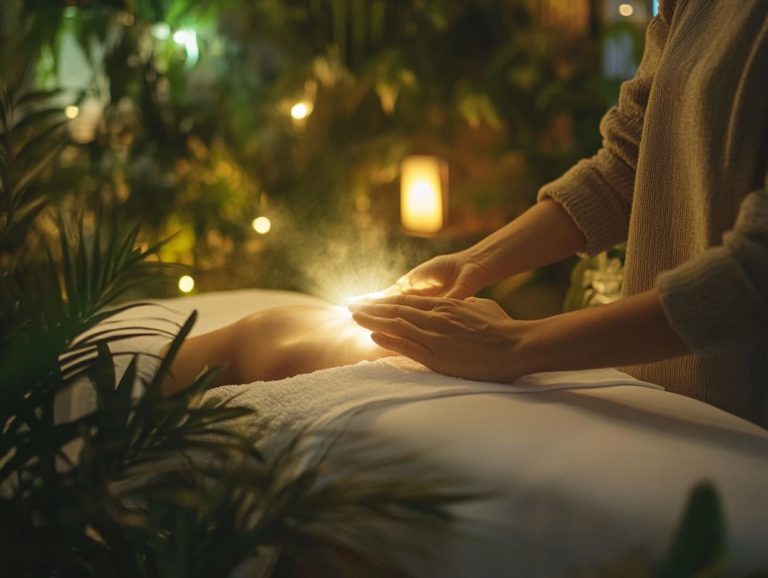5 Simple Changes to Reduce Anxiety Naturally
Anxiety can sometimes feel like an insurmountable weight, but there are straightforward, natural approaches you can adopt to regain control and cultivate a sense of calm in your life. These include mindfulness practices and good nutrition.
Take charge of your anxiety today with these simple and effective strategies. Consider making five impactful changes:
- Practice deep breathing techniques to reduce anxiety daily.
- Incorporate mindfulness meditation into your routine to improve overall emotional health.
- Prioritize regular exercise as an effective way to elevate your mood.
- Focus on restorative sleep and explore healthy habits.
- Maintain a balanced diet.
It s important to remember that anxiety impacts your body, so exploring beneficial exercises such as walking and yoga is crucial. Also, recognize when it s time to seek professional support.
By implementing these strategies, including regular exercise and mindfulness, you can enhance your ability to navigate anxiety with natural remedies and discover a greater sense of peace.
Contents
- Key Takeaways:
- 1. Breathe Your Way to Calm
- 2. Embrace Mindfulness Meditation
- 3. Exercise Regularly
- 4. Get Enough Sleep
- 5. Eat a Well-Balanced Diet
- How Does Anxiety Affect the Body?
- What Are the Benefits of Deep Breathing Techniques?
- How Can Mindfulness Meditation Help with Anxiety, Particularly During COVID-19?
- What Types of Exercise Are Most Beneficial for Reducing Anxiety?
- How Does Lack of Sleep Contribute to Anxiety?
- What Foods Should Be Avoided to Help Reduce Anxiety?
- Are There Any Supplements or Herbs That Can Help with Anxiety?
- What Are Some Other Natural Remedies for Anxiety?
- How Can a Support System Help with Managing Anxiety?
- What Are Some Coping Mechanisms for Dealing with Anxiety?
- When Should a Person Seek Professional Help for Anxiety?
- Frequently Asked Questions
- What are 5 simple changes I can make to reduce anxiety naturally?
- How can deep breathing exercises help reduce anxiety?
- How can moving your body help ease anxiety?
- What are the effects of caffeine and alcohol on anxiety?
- How does sleep affect anxiety?
- What are some examples of mindfulness and relaxation techniques for reducing anxiety?
Key Takeaways:

- Practice deep breathing and incorporate mindfulness meditation for improved emotional health.
- Regular exercise can be an effective way to reduce anxiety and improve mood.
1. Breathe Your Way to Calm
Practicing deep breathing techniques can significantly alleviate your anxiety and enhance your emotional wellness. These techniques foster relaxation and mindfulness, as highlighted by experts like Dr. Jamie Dupuy.
Methods such as diaphragmatic breathing, box breathing, and the 4-7-8 technique provide a toolkit for managing daily stressors. Research indicates these approaches lower your heart rate and activate your body s relaxation response, promoting a profound sense of peace.
Dr. Jamie Dupuy underscores the importance of weaving these practices into your daily routine. He suggests short sessions during breaks or just before bedtime to fully benefit from them. By making deep breathing a regular habit, you cultivate resilience, leading to improved emotional health and a more balanced life.
2. Embrace Mindfulness Meditation
Incorporating mindfulness meditation into your daily routine can significantly alleviate anxiety disorders and enhance your emotional wellness. This practice invites you to focus on the present moment, fostering a healthier relationship with your thoughts and emotions.
By dedicating just a few minutes each day to mindfulness, you cultivate greater resilience and clarity. Recognizing the power of mindfulness means embracing principles like non-judgment, compassion, and acceptance, which help manage emotional burnout.
Find a quiet space free from distractions, with soft lighting and comfortable seating, to create an inviting atmosphere. For beginners, a wealth of resources is available, including apps and online classes, offering guided sessions that make transitioning into this enriching practice seamless and enjoyable.
Start incorporating these practices into your life today for a calmer tomorrow!
3. Exercise Regularly
Regular exercise is a powerful tool against anxiety and depression. Activities like walking, yoga, and team sports release endorphins, which boost your mood.
You’re not just improving your fitness but also tackling stress and emotional burnout, especially during tough times like the COVID-19 pandemic.
Exercises benefit both your body and mind. For example, running or swimming increases your heart rate and releases serotonin, a brain chemical that calms anxiety.
Yoga and deep breathing help you relax, soothing your nervous system and bringing a sense of peace.
Experts recommend at least 150 minutes of moderate exercise each week. Even short bursts of movement can make a big difference.
Consistency is key. Make exercise a part of your daily life to boost your mood and resilience against stress.
4. Get Enough Sleep
Sleep is crucial for your mental well-being. Poor sleep can heighten anxiety and depression, as shown by CDC research.
Quality sleep regulates stress and helps you make healthier choices. This is vital in today s fast-paced environment.
Establishing a good bedtime routine can change your life. Unwind with calming activities like reading or herbal tea.
Create a sleep-friendly space that’s quiet and cozy. Avoid stimulants like caffeine before bed to help your body relax.
By prioritizing sleep, you can enjoy peaceful nights and a calmer mind.
5. Eat a Well-Balanced Diet
A well-balanced diet rich in omega-3 fatty acids can greatly impact your mental health. Foods high in omega-3s and vitamins help regulate mood through neurotransmitters like serotonin.
Incorporate fatty fish, leafy greens, nuts, and seeds into your meals. Stay hydrated to support brain function and emotional stability.
Limit processed foods and sugars, as they can worsen anxiety. Herbal teas and CBD oil can also soothe your mind.
Focus on a nutrient-rich diet and proper hydration to build a strong foundation for better mental health and anxiety resilience.
How Does Anxiety Affect the Body?

Anxiety can deeply impact your body, presenting various physical symptoms that range from an increased heart rate to muscle tension. Digestive issues and chronic fatigue can also arise. This illustrates the intricate connection between your mental health and physical well-being, highlighting the role of lifestyle changes.
Understanding how anxiety activates your body’s stress response is vital for developing effective coping strategies, especially given the mental health challenges heightened by the COVID-19 pandemic. This also stresses the need for a support system.
When you experience anxiety, your stress hormones can increase, leading to symptoms such as shallow breathing or digestive issues. Chronic fatigue can often exacerbate these symptoms, especially due to poor sleep patterns. These physiological responses occur as your body prepares to confront or escape perceived threats, which, in today s world, often stem from daily stressors rather than actual danger.
Recognizing these signs early is crucial to prevent self-harm and manage anxiety effectively. As your awareness grows, you can implement proactive measures, such as integrating mindfulness practices, regular exercise, and balanced nutrition, including good hydration, into your daily routine. Such adjustments can significantly reduce the negative effects of anxiety, fostering overall health and resilience.
What Are the Benefits of Deep Breathing Techniques?
Deep breathing techniques present a wealth of benefits for managing stress and enhancing emotional well-being. They can significantly reduce anxiety and foster relaxation, especially for those facing mental health challenges. These exercises enable you to take control of your breath, transforming it into a powerful ally for managing acute stress responses and cultivating a profound sense of calm, which is essential for mental health.
One of the standout advantages of these techniques is their remarkable ability to activate a part of your nervous system that helps you relax, effectively counteracting the stress-induced fight-or-flight response. By seamlessly incorporating deep breathing into your daily routine like taking five slow, deep breaths before a meeting or practicing a type of deep breathing that engages your diaphragm during a brief moment of solitude you can sharpen your focus and elevate your decision-making prowess, especially in stressful situations.
You can use methods like the 4-7-8 technique inhale for four counts, hold for seven, and exhale for eight to ground yourself when feeling overwhelmed. This will help you regain mental clarity even amidst the busiest of circumstances, particularly after the mental toll of COVID-19.
How Can Mindfulness Meditation Help with Anxiety, Particularly During COVID-19?
Mindfulness meditation can be a game changer for anyone grappling with anxiety disorders, as highlighted by experts like Dr. Jamie Dupuy, an expert in mental health. By embracing mindfulness, you can cultivate a heightened awareness of your thoughts and emotions, allowing you to observe your anxieties without judgment. This practice can free you from their grip, empowering your emotional well-being and overall mental health.
Studies show that mindfulness can change how you think and feel. This enables you to identify and release the negative thought patterns and emotional burnout that often escalate anxiety. For example, a study featured in the journal JAMA Internal Medicine, highlighting the importance of mental health revealed that mindfulness meditation can lead to moderate improvements in symptoms of anxiety and depression, which often accompanies anxiety disorders.
Now is the time to embrace mindfulness; it can dramatically change how you handle anxiety! Consider utilizing guided meditations and apps like Headspace and Sanvello or Calm, both of which are popular apps for mindfulness practices. These resources are excellent for beginners, offering structured practices that seamlessly fit into your daily routine. Not only do these tools promote relaxation, but they also foster a consistent practice, paving the way for lasting change over time.
What Types of Exercise Are Most Beneficial for Reducing Anxiety?
Certain types of exercise work wonders for reducing anxiety. You ll find cardiovascular activities, such as walking, strength training, and other forms of physical activity particularly beneficial. Mind-body practices like yoga also promote the release of endorphins, which can really lift your mood. Research from the CDC shows that engaging in regular physical activity not only enhances your physical health but also serves as a powerful ally in managing anxiety symptoms.
The link between exercise and mental well-being is well established. Aerobic exercises, which include activities like running and cycling, can significantly reduce anxiety levels by improving sleep quality and boosting your self-esteem. Strength training is essential too; it plays a crucial role in building resilience against stress. Mind-body exercises, especially yoga and tai chi, cultivate mindfulness, helping you reconnect with your body and ease feelings of unease.
To truly harness the benefits of these exercises, consider crafting a balanced weekly routine. Alternate your cardiovascular workouts with strength training, and make sure to carve out time for relaxation techniques like meditation. This holistic approach can lead to effective anxiety management and a more balanced life.
How Does Lack of Sleep Contribute to Anxiety?
A lack of sleep can intensify anxiety, creating a vicious cycle that undermines your mental well-being and emotional stability. Your sleep patterns are crucial for managing anxiety and are intricately tied to mood regulation. Insufficient sleep can amplify stress responses, as highlighted by research from the CDC on mental health trends.
When you experience sleep deprivation, you might find yourself caught in a relentless loop of worry, restlessness, and a heightened stress response. This complicates your ability to unwind and achieve restorative sleep. Prioritizing quality rest is a game-changer for your emotional wellness!
By adopting a consistent sleep schedule, establishing a calming bedtime routine, and minimizing screen time before bed, you can significantly enhance your sleep quality.
Addressing these factors not only helps alleviate anxiety symptoms but also strengthens your overall mental health, paving the way for improved emotional resilience and stability.
What Foods Should Be Avoided to Help Reduce Anxiety?
Certain foods can increase anxiety; it’s best to avoid them. Those high in sugar, packed with processed ingredients, or laden with alcohol can negatively impact your emotional wellness and exacerbate anxiety symptoms. Understanding how your diet influences mental health is crucial for making informed lifestyle choices that promote a balanced and healthy state of mind.
Take caffeine, for example. Found in coffee and energy drinks, it can ramp up your heart rate and leave you feeling jittery, intensifying any underlying anxiety you may have. Then there are trans fats, lurking in fried and heavily processed foods, which can trigger inflammatory responses that might affect your brain health.
Instead, consider opting for nutrient-rich options like leafy greens, whole grains, and omega-3 fatty acids from fish, which are healthy fats that support brain health. These healthier choices can provide calming benefits, helping maintain stable blood sugar levels that influence your mood and supplying essential nutrients for a more resilient mental state. Don t let unhealthy foods hold you back from feeling your best!
Are There Any Supplements or Herbs That Can Help with Anxiety?

Many supplements and herbs can help reduce anxiety. Omega-3 fatty acids, CBD oil, and chamomile tea are among them. They promote relaxation and emotional stability.
Research suggests that omega-3 fatty acids, commonly found in fish oil, can bolster brain health and may reduce anxiety symptoms at a dosage of 1,000 to 2,000 mg daily. However, it’s wise to be aware of potential side effects, such as digestive upset can occur with certain supplements.
CBD oil has surged in popularity for its calming effects. It is typically administered in doses ranging from 25 to 300 mg per day. Some individuals may experience drowsiness or gastrointestinal issues as potential side effects.
Sipping chamomile tea throughout the day can offer soothing properties without serious side effects, making it a gentle option for enhancing your sense of serenity.
By understanding these elements, you can make informed choices in managing anxiety effectively.
What Are Some Other Natural Remedies for Anxiety?
Aside from supplements, various natural remedies effectively address anxiety. Mindfulness practices, aromatherapy for anxiety, and calming techniques like deep breathing and progressive muscle relaxation can enhance your emotional wellness.
Integrating these practices into your daily life can be easy and rewarding. Set aside just a few minutes each day for mindfulness meditation to ground yourself and quiet racing thoughts. Incorporating essential oils through diffusers or personal inhalers can uplift your mood and promote relaxation.
During stressful moments, deep breathing exercises can provide instant relief. Progressive muscle relaxation can become a soothing nighttime ritual that encourages better sleep. By making these remedies a part of your routine, you may notice a significant reduction in anxiety symptoms and an overall improvement in your mental health.
How Can a Support System Help with Managing Anxiety?
A strong support system is vital for managing anxiety and promoting emotional wellness. It encourages you to share your experiences, fostering a sense of belonging and understanding.
Friends, family, and mental health professionals play pivotal roles as you navigate the challenges posed by anxiety disorders. Having a reliable network not only alleviates feelings of isolation, which can worsen mental health challenges, but also fortifies your resilience during tough times.
To build this invaluable network, start by reaching out to trusted friends and family members or exploring support groups where shared stories can cultivate connections. Maintaining these relationships requires consistent communication and active participation, whether through regular check-ins, shared activities, or virtual meet-ups.
Prioritizing this support can significantly enhance your mental well-being, making the journey of managing anxiety feel much less daunting. For effective strategies, check out 5 tips for anxiety training success and take charge of your anxiety!
What Are Some Coping Mechanisms for Dealing with Anxiety?
Establishing effective coping mechanisms for better stress management is crucial for managing anxiety. Techniques such as mindfulness and relaxation exercises help manage anxiety. Lifestyle changes are essential for long-term mental health. These approaches enable you to reclaim control over your mental well-being and cultivate healthier habits.
Incorporating these methods into your daily routine can be truly transformative. For example, practicing mindfulness can be as straightforward as dedicating just a few minutes each day to deep breathing and being fully present in the moment. This practice can help quiet those racing thoughts.
Setting aside time for physical activity whether it s a brisk walk or a calming yoga session enhances overall health and acts as a powerful stress reliever. Establishing a consistent sleep schedule and prioritizing nutritious eating can greatly improve your mood.
By making these simple changes today, you can cultivate resilience in the face of anxiety and explore natural ways to manage anxiety attacks to enhance your overall quality of life.
When Should a Person Seek Professional Help for Anxiety?
Knowing when to seek professional help for anxiety is essential, especially when symptoms interfere with daily life or lead to self-harm or emotional burnout. Mental health professionals provide personalized interventions, including talk therapy that helps change negative thoughts or medication, to effectively address anxiety disorders.
Recognize the signs that indicate support may be necessary, such as persistent worry, difficulty concentrating, or feelings of overwhelming dread. You might also notice that your anxiety impacts your relationships or work performance.
Various treatment options are available, from talk therapy to prescribed medications and lifestyle changes that can enhance your overall well-being. Taking mental health seriously is crucial; reaching out for help can pave the way toward recovery.
Building a supportive network whether through friends, family, or support groups can significantly enhance your healing process and inspire you to engage fully in your wellness journey.
Frequently Asked Questions
What are 5 simple changes I can make to reduce anxiety naturally?

- Practice deep breathing exercises
- Engage in regular physical activity
- Reduce caffeine and alcohol intake
- Get enough quality sleep
- Incorporate mindfulness and relaxation techniques into your daily routine
How can deep breathing exercises help reduce anxiety?
Deep breathing exercises help slow down your heart rate and promote relaxation. This can help reduce symptoms of anxiety such as racing thoughts and feelings of panic.
How can moving your body help ease anxiety?
Regular physical activity increases the production of endorphins, which are natural mood-boosters and can help reduce feelings of anxiety and stress.
What are the effects of caffeine and alcohol on anxiety?
Caffeine and alcohol can increase feelings of anxiety and make symptoms worse. It is best to limit or avoid these substances for better anxiety management.
How does sleep affect anxiety?
Lack of sleep or poor-quality sleep can worsen anxiety symptoms. Getting enough quality sleep allows your body and mind to rest and recharge, reducing the impact of anxiety.
What are some examples of mindfulness and relaxation techniques for reducing anxiety?
Examples of mindfulness and relaxation techniques include meditation, yoga, progressive muscle relaxation, and journaling. These practices can help calm the mind and reduce anxiety levels.
Explore these techniques for yourself and take the first step towards managing your anxiety more effectively!






